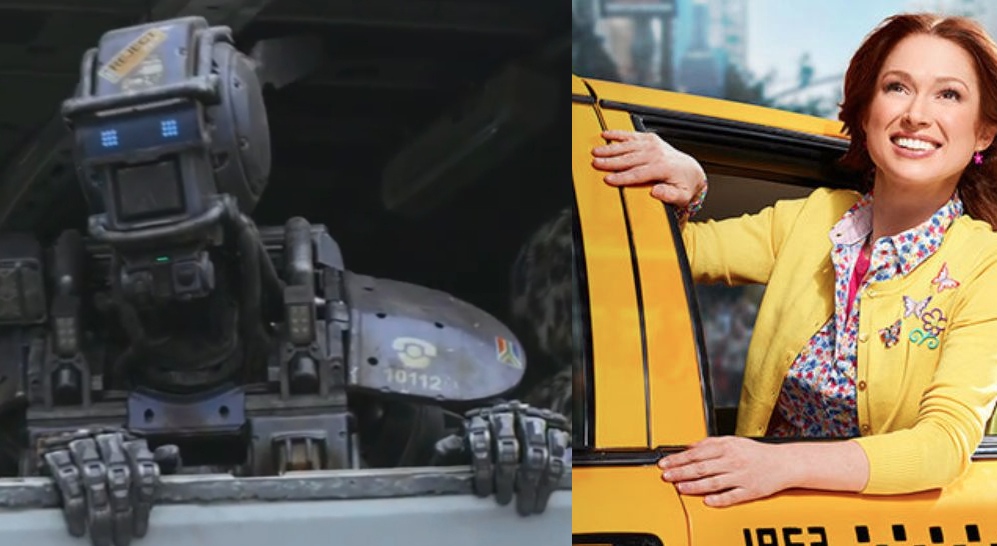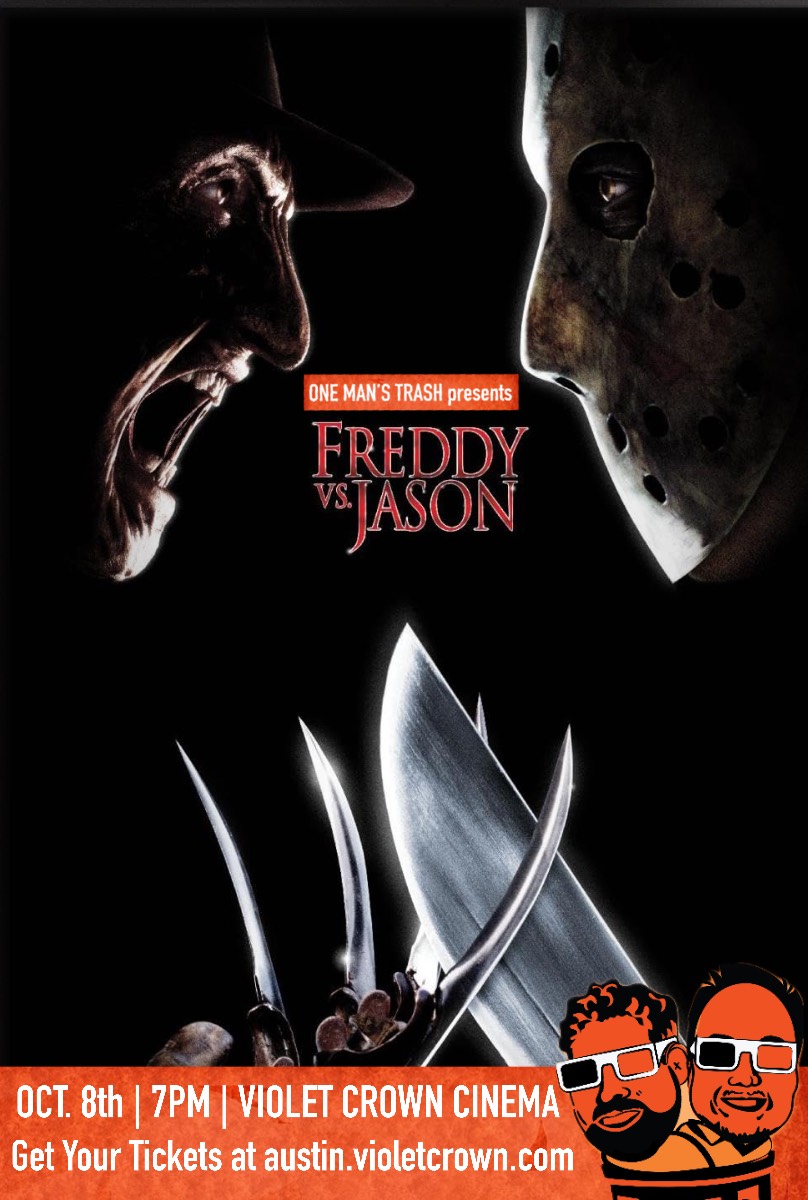One wouldn’t think that a former cult member who spent fifteen years underground would be able to beat a sentient police robot. Yet, the first season of Tina Fey’s Netflix series Unbreakable Kimmy Schmidt ran circles around Neill Blomkamp’s latest film Chappie, both of which were released over this past weekend and received very polar opposite reception from critics & audiences alike in terms of entertainment value, artistic craft and as follow ups to their creators’ previous efforts. Fey, coming off the end of her critically beloved cult favorite NBC TV series 30 Rock, managed to return to the sitcom format with a sweet and absurd show that takes the “girl trying to make it on her own in the big city” premise and give it a modern & hilarious spin that only she and her 30 Rock co-creator Robert Carlock really could. Meanwhile, Blomkamp pulled a career low with Chappie, a disastrously conceived and plotted mess of a film that takes elements of the themes, style and setting from both his acclaimed success District 9 and even his disappointing follow up Elysium, yet never gives this sci-fi action thriller about a naive robot gaining sentience a proper story to hang on.
Now, it’s fair to say that Kimmy Schmidt and Chappie aren’t that similar in many respects. They’re both told from different forms of storytelling media, cultural perspectives and artistic visions. However, there are some intriguing similarities in terms of character and theme, mainly the titular characters and their struggles to become acclimated to the world. Kimmy, a young woman who had been trapped for fifteen years in a bunker as part of a bizarre cult in Indiana, tries to get past her trauma and move on with her life in the real world of New York City. Chappie is a former police robot that is given sentience in an experiment by the designer of these robots as part of a new program and tries to fit into his surroundings of a crime infested Johannesburg, South Africa. Both Kimmy and Chappie suffer many hardships & judgements based on their cheery dispositions and curiosity for a world they’re unfamiliar with, but attempt to face things head on. This is part of why the best asset for both pieces is their main characters, with Kimmy exhibiting an exuberant wide eyed giddiness that only Ellie Kemper (best known to audiences for The Office) could bring to life and Chappie having a naive but charming determination to grow & learn about the world he’s metaphorically just been born into as wonderfully brought to life by frequent Neill Blomkamp collaborator Sharlto Copley through effective motion capture integration and an adorably understated vocal performance.

Of course, where Chappie and Schmidt start to diverge is with the rest of their production. Schmidt‘s first season had more than just a larger amount of time to tell a story going for it. The show has an incredibly sharp sense of humor, recalling the quick wit of 30 Rock. Yet at the same time, Schmidt never manages to feel like a carbon copy of it’s predecessor, with Fey & Carlock working with a much different female archetype than Liz Lemon. Schmidt is a younger, but more confident and earnest character than Lemon, with her problems coming more from her lack of exposure to the modern world and her sudden exposure to adult responsibilities after being stuck underground since she was a middle schooler than the cynical and overworked sassiness of Lemon. Plus, the cult storyline is gives the overall arc of Kimmy a darker layer, establishing her willpower and determination that truly sells what makes her as unbreakable as the title suggests with the aftermath of the cult hovering over her new life constantly. It’s a compelling arc that gives a solid backbone to the hilarious jokes of the show and a great running thread to tie around Kimmy’s adventures with the superb supporting cast, including Titus, Kimmy’s proudly larger than life roommate (played charmingly by Titus Burgess), her boisterous landlady Lillian (played by a better than ever Carol Kane) and her wealthy socialite friend/employer Jacqueline (played by Fey’s always reliable for a snipey laugh 30 Rock co-star Jane Krakowski).
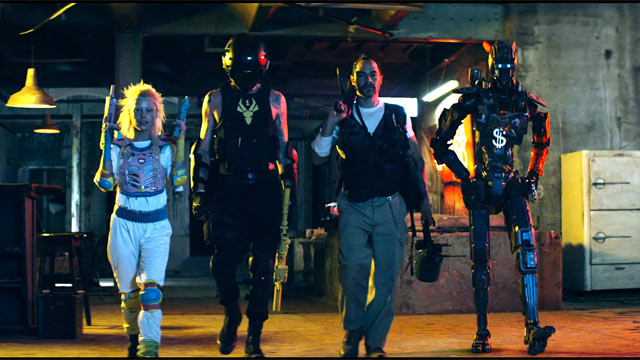
Chappie on the other hand has a much more muddled story that constantly meanders from the start. We’re introduced to a bunch of documentary talking heads that speak of Chappie the robot being the next step in evolution… but they never come back. Not even at the end of the film. Things only get weirder from there as the creator of the robot police force Deon (a rather underwhelmingly dull performance from Dev Patel) uses a damaged one as a test subject, unbeknownst to the company owner (an utterly wasted Sigourney Weaver) and the rival robot designer/former soldier/religious zealot/one dimensional villain (played by Hugh Jackman with the worst haircut of his career). He is brought to life after Deon is captured by a gang consisting of Die Antwoord’s Yolandi & Ninja and a random Hispanic thug stereotype (Jose Pablo Cantillo), the former two of whom treat the newly alive Chappie as their adoptive son. Blomkamp’s themes get lost from there, stuck between ideas of mortality, nature vs. nurture, gang violence, corporate greed and the capabilities of AI in a fashion that never really pays off Chappie’s development as a character. In fact, they contradict much of the messages with opposing behavior from Chappie, particularly during the climactic scenes with Hugh Jackman’s character.

It’s honestly not that huge a surprise given how Elysium went for Blomkamp. While not as disastrously out of whack like Chappie, Elysium was the first indication of what the latter film eventually gave more evidence to; Blomkamp may be a one trick pony as a filmmaker. It’s not that Blomkamp isn’t trying, as both films show a dedication to his work as a visual artist and his knack for creating engaging concepts, but he doesn’t flesh them out very well to the point of diluting the entertainment value of his work. Unbreakable Kimmy Schmidt may not be reaching for aspirations quite as lofty, but the show manages to stick to it’s guns on theme and tone without sacrificing character, story arcs or surprising reveals. Tina Fey and Robert Carlock are aware of what they want their show to be and don’t stray too far away from it’s sweet and endearing characters. Chappie reaches for so much that it forgets to make logical sense of anything that’s going on (particularly with the security of this high tech robot company and how much Hugh Jackman can somehow get away with) or develop any sort of narrative throughline with it’s various dangling plots that it has going at any given time.
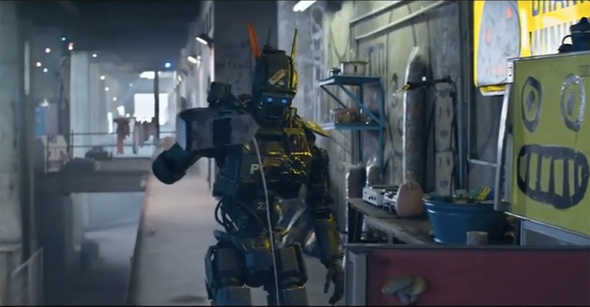
Much of the disappointment though really has to do with the lack of artistic growth on Neill Blomkamp’s end. All the familiar tropes of the director are here; South African setting, classicism, Sharlto Copley, the works. Yet, most of them are used in new or creative fashions than before, with certain shots feeling straight from District 9. His style has become so indistinguishable that the initially unique and startling vision of that film seems to be less of a deliberate choice for that story and more of a retread of old ideas he can’t shake off. As I said earlier, Fey and Carlock by comparison have really managed to create a show that, while having familiar elements of 30 Rock‘s DNA, still feels like a different show, evolving the style around different scenarios and character dynamics. The Kimmy/Titus friendship, for example, doesn’t retread the earlier territory of the Liz Lemon/Jack Donaghy dynamic, with the former having more of a two small fishes forming a school in a big pond kind of feel rather than the creative and business sides of television finding a common ground. Chappie meanwhile merely uses its the characters for the needs for the basic plot and social commentary rather than those characters, such as the half assed attempt at a dynamic between the titular robot and his “surrogate parents” Yolandi and Ninja, who go from coddling him to completely ignoring him to forcing him into criminal situations through manipulative means. Yet, they’re never really treated with any moral ambiguity or dimension that Blomkamp should be displaying before being put in danger during the climax in a fashion that’s supposed to keep us invested, but just rings as hollow.

That lack of commitment really does hurt the characters and story overall by the end of Chappie. Schmidt is a show that lives on the strength of it’s characters and the arcs they go throughout the season. By the time we reach the end of the first season, Kimmy Schmidt has sought love, tried reasoning with the youth of today with her babysitter job, worked diligently toward getting a GED and come face to face with her past at the trial of her captor in Indiana, yet she still has problems that don’t get neatly resolved by the season finale. She is a fully realized and empowering female character that isn’t afraid to show off her weaknesses, but strives to push past them in favor of taking back the freedom she lost for so long. It’s part of the recurring threads in Fey’s work in 30 Rock or even Mean Girls; giving the world rich and diverse characters that are more often compromised by their own relatable insecurities rather than the expectations of society. Aside from Chappie himself, Chappie rarely gives time for the characters to become endearing or even the least bit human despite coming from varying backgrounds. Dev Patel for example, says he’s committed himself so much to the pursuit of giving life to AI, but all that is seen of him attempting to accomplish this goal is directly telling it to the audience via video log where he downs a couple Red Bulls to get from 97% to 100% on the project. No real struggle, no real conflict, just shoving forced product placement and exposition in front of the camera without so much as brief moment of struggle or pain that feels earned, much like the rest of this film. The same goes double for Hugh Jackman’s role, which gives him such little motivation for his character that he literally becomes a maniacally laughing cartoon by the climax instead of a fully realized character with emotional steaks. He, like so many of the other characters, are just mere pawns to service the story.
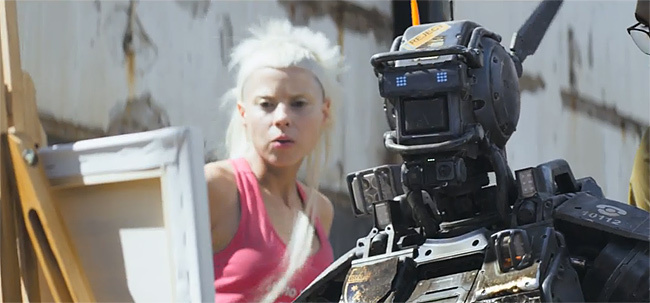
Both Chappie and Unbreakable Kimmy Schmidt have naive titular characters that pride themselves on their durability. Their resilience in the face of adversity is meant to give us a sympathetic ear for their hardships as their stories evolve. Yet, in terms of delivery of those ideas, Schmidt shows it off in a bright eyed & dazzlingly entertaining fashion while Chappie quite frankly falls to pieces before it can finally limp towards an ending. The former proves Tina Fey and Robert Carlock share the same durability of their protagonist, working through the expectations of their fans in a way that doesn’t disappoint yet avoids pandering. The latter gives substantial evidence that Neill Blomkamp can’t seem to leave his wheelhouse and explore new territory, to the point where his upcoming turn on the Alien franchise could easily be in danger of crashing and burning on the limited capabilities of the director’s vision. Of course, Blomkamp could turn things around and find a new creative avenue to explore in the future, but we’ll have to wait and see. If he can finally deliver on the promise of District 9, it’ll have to be through abandoning that film’s aesthetics in favor of something new. Until then, we’ll have to far more than settle for proven evolving artists giving us work that consistently entertains, right from the theme song.
Interested in picking up some of the titles mentioned in the article? Please use our Amazon links to do so!


